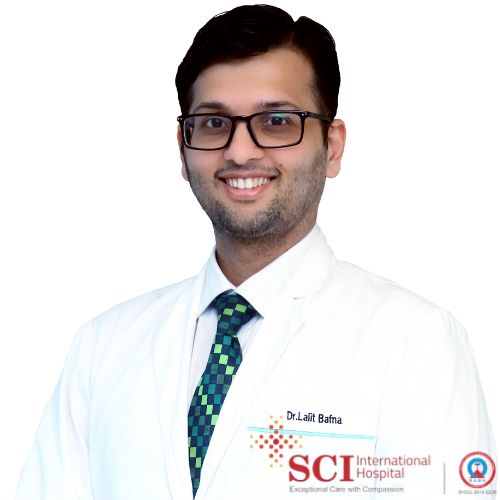As a team of experienced orthopedic surgeons at SCI Hospital, Delhi, we are dedicated to providing advanced solutions for patients suffering from severe shoulder pain, arthritis, or injury. This comprehensive guide covers everything you need to know about shoulder replacement surgery, including types, benefits, recovery, costs, and how to choose the best care in Delhi. Our aim is to ensure you are fully informed and confident about your treatment options.
We Are Rated
Consult Now
Shoulder replacement surgery (shoulder arthroplasty) is a procedure where the damaged parts of the shoulder joint are replaced with artificial components, known as prostheses. This surgery is designed to relieve pain, restore function, and help patients regain their independence. At SCI Hospital, our team utilizes the latest techniques and prosthetic systems for optimal outcomes.
Shoulder joint replacement is recommended for patients who experience:
If you are unable to perform daily activities, sleep comfortably, or experience chronic pain, our orthopedic team may suggest shoulder replacement as the best solution.
We offer a full spectrum of shoulder replacement options, tailored to the needs of each patient:
Type of Surgery Description Best For Total Shoulder Replacement Both the ball (humeral head) and socket (glenoid) are replaced Arthritis, joint degeneration, complex fractures Reverse Shoulder Replacement Ball and socket positions are switched; ball on shoulder, socket on arm bone Severe rotator cuff tears, failed previous surgery Partial Shoulder Replacement Only the ball of the upper arm bone is replaced Certain fractures, limited joint damage Anatomic Total Shoulder Replacement Artificial parts mimic natural anatomy Patients with healthy rotator cuff Eclipse Shoulder Replacement Specialized prosthesis system for select anatomic cases Based on anatomy and surgeon's recommendation
Total shoulder replacement is the most common type of shoulder arthroplasty. Both the ball (head of the humerus) and the socket (glenoid) are replaced with artificial components. This procedure is highly effective for patients with advanced arthritis or significant joint damage, resulting in restored movement and pain relief.
Reverse shoulder replacement is a specialized procedure where the normal ball-and-socket structure is reversed: a metal ball is attached to the shoulder socket, and a plastic cup is fixed to the upper arm bone. This design allows the deltoid muscle to move the arm, making it ideal for patients with severe rotator cuff injuries or failed prior surgeries.
Feature Total Shoulder Replacement Reverse Shoulder Replacement Anatomy Mimics natural joint Ball and socket positions reversed Rotator Cuff Requires healthy rotator cuff Effective even with torn rotator cuff Common Use Arthritis, fractures Rotator cuff arthropathy, failed repairs Movement Restores normal movement Uses deltoid muscle for arm movement
Partial shoulder replacement (hemiarthroplasty) involves replacing only the ball of the upper arm bone, leaving the socket intact. This option is typically recommended for certain fractures or when only one part of the joint is damaged.

MBBS, MS - Orthopaedics, Orthopaedic surgeon, Joint Replacement Surgeon

MBBS, MS - Orthopaedics, DNB - Orthopedic Surgery, Orthopedic surgeon, Joint Replacement Surgeon
An anatomic total shoulder replacement uses prosthetic components that closely mimic the natural anatomy of the shoulder. This technique is ideal for patients with a healthy rotator cuff and good bone quality, providing excellent pain relief and restored movement.
Eclipse shoulder replacement refers to a specific prosthesis system designed for anatomic total shoulder arthroplasty. It offers unique fixation and bone-preserving features, and is selected based on the patient’s anatomy and the surgeon’s expertise.
Shoulder joint replacement is another term for shoulder arthroplasty, where the damaged surfaces of the shoulder joint are replaced with artificial parts to relieve pain and restore function.
A full shoulder replacement is synonymous with total shoulder replacement, where both the ball and socket of the shoulder joint are replaced with prosthetic components, providing comprehensive treatment for severe joint damage.
Delhi is home to many highly experienced orthopedic surgeons specializing in shoulder replacement. At SCI Hospital, our team is recognized for its expertise, advanced training, and patient-centered approach. We encourage patients to choose a surgeon with a strong record in shoulder arthroplasty and access to the latest technology.
Our surgical team follows these steps:
Shoulder implants are made from:
Most patients can lift their arm, reach overhead, and perform routine tasks without pain after recovery.
While shoulder replacement is generally safe, potential complications include:
At SCI Hospital, we use the latest techniques and provide careful aftercare to minimize these risks.
To protect your new joint, avoid:
Our physiotherapy team will provide a personalized exercise plan for safe recovery.
The shoulder replacement surgery cost in Delhi depends on:
After consultation, our team provides a detailed, personalized estimate. Most insurance plans cover shoulder replacement, and our staff will help you with claims and payment options.
Modern shoulder implants can last 15–20 years or more with proper care. Longevity depends on the type of implant, surgical technique, and patient activity level.
No, cartilage cannot be replaced by itself as it doesn't regrow. Shoulder replacement surgery addresses this by replacing the entire damaged surface with smooth artificial parts.
It is one of the most successful procedures in modern medicine. Over 90% of patients experience dramatic pain relief and a significant improvement in their ability to perform daily activities.
With modern implants and techniques, you can expect your new shoulder to last for 15-20 years or even longer.
Full recovery can take up to a year, but you'll see major improvements much sooner. Most patients are out of their sling in 4-6 weeks and begin active physical therapy to restore motion and strength.
For patients with debilitating pain, the answer is overwhelmingly yes. Restoring your ability to sleep, dress yourself, and live without constant pain makes it an incredibly worthwhile procedure.
Consult Now
